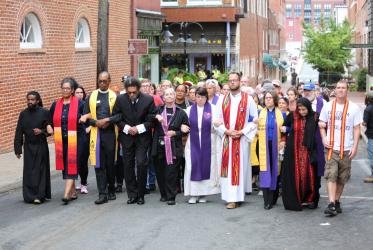The day also coincided with the United Nations International Day for People of African Descent.
The celebration opened with a recording of the late moderator of the WCC central committee Dr Agnes Abuom, who reflected on the search for just peace. She spoke of the importance “for us to look at our inner spiritual, theological understanding of our faith in the context of structures of injustice. We will engage as a World Council of Churches at the global level…in working together to improve the livelihoods of many people globally.”
World Council of Churches (WCC) progamme director for Public Witness and Diakonia Rev. Dr Kenneth Mtata expressed appreciation of the gathering, particularly as the WCC celebrates its 75th anniversary.
“While the participation of white Europeans and possibly North Americans has never been questioned in the formation and the growth of the World Council of Churches, questions have always been asked as to the role played by Black people or Africans, in Africa and in the diaspora, in the history of the WCC,” he said.
Mtata noted that the WCC’s commitment to the humanity, dignity, and rights of Black people was further highlighted and strengthened through the Programme to Combat Racism in 1969.
“Even more troubling was the acknowledgement that this problem was also entrenched in the churches,” he said.
The celebration panel brought together seasoned and emerging, young ecumenists, namely, Rev. Prof. Sam Kobia, Marilia Schüller, Rev. Dr Angelique Walker-Smith, Rev. Dr Majorie Lewis, Rev. Daimon Mkandawire, and Dr Lisa Adjei.
Former WCC general secretary Kobia stated that the core concerns of 20th century giants WEB Dubois and Phillip Potter, regarding racism and ecumenism still apply today. Despite the work of former WCC general secretary Potter, “whose work spanned six decades;” Kobia lamented that “it is actually [not until] the WCC 4th a+Assembly in Uppsala in 1968, that the presence of the Black people was felt.”
Schüller, former WCC staff member, emphasized the importance of remembering our ancestors forcibly captured, trafficked and enslaved away from their motherland and shared pictures and significant contributions of black Latin American ecumenists.
Lewis spoke of her introduction to Orthodox liturgy back in 1979, while studying at United Theological College, Jamaica, which marked her first engagement with the WCC. Punctuating her sharing with the refrain “we say their names,” brief biographies and photos of some influential Black ecumenists, Lewis referenced the cloud of witnesses; late and living ecumenists including the often-unacknowledged ecumenical music composer Doreen Potter, and Mercy Amba Oduyoye.
Walker-Smith, WCC president from North America, acknowledged Black pioneers in the ecumenical movement and her forthcoming book on Pan-African women of faith. Walker-Smith asserted, “we have contributed to this movement, to the earliest formations of the global ecumenical movement through the WCC and related movements.” She celebrated Dr Benjamin E. Mays, former central committee member and Dr Martin Luther King Jr’s mentor, who “convened one of the earliest ecumenical interfaith global consultations on race relations in 1939.”
Responding to the seasoned ecumenists’ presentations, young ecumenist Rev. Mkandawire said, “it is evident that Black individuals have been integral to the ecumenical movement from its early days. Their contributions, sometimes overlooked, have shaped the movement’s values of unity, inclusivity, and social justice. For us as young people, ecumenism is not just a theoretical concept, [but] a lived experience.” He further called for the ecumenical movement “to harness the power of technology to amplify marginalized voices, share diverse narratives and advocate for justice on a larger scale.”
Dr Lisa Adjei paid tribute to Arthur Riley by reiterating, “we need a diversity of people to reflect God more fully. Anything less and the image becomes pixelated and grainy. Still beautiful but lacking in clarity.” She spoke of the need and importance of partnership collaboration, and inclusion, to engage young people and keep them immersed in ecumenism.
The webinar concluded by acknowledging the role of the giants of the past, challenging present ecumenists to provide a pedestal for the future to make sure that “ecumenism will not retire any time soon!”









